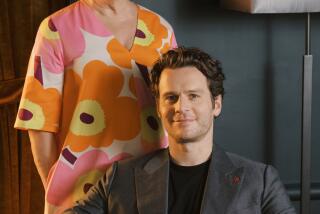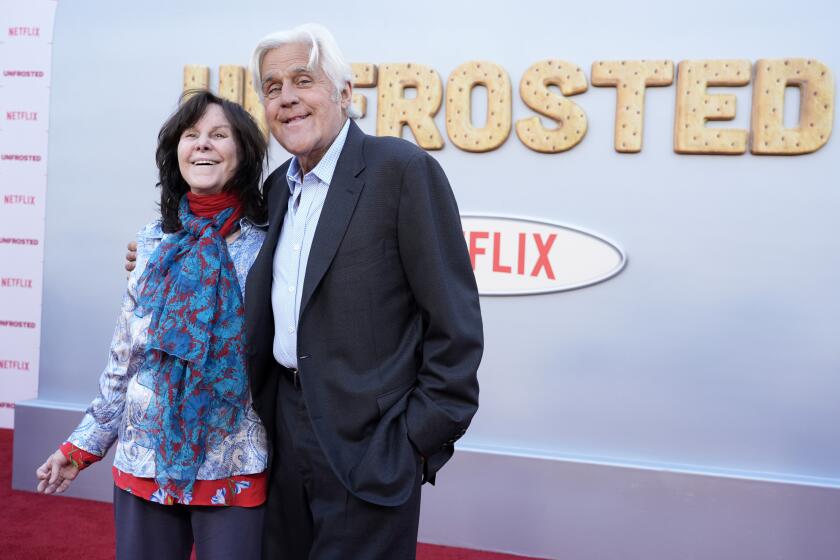A Revival of ‘Eternal Road’ Proves to Be Arduous Journey
- Share via
BROOKLYN, N.Y. — “The Eternal Road” wound through Brooklyn Monday night on its way from Germany to Israel, and sitting through it felt like an endless slog.
Franz Werfel’s staged anthology of Old Testament tales, loosely stitched together by Kurt Weill’s changeable score, is a work that bears the scars of its evolution. Weill tried to turn Werfel’s stately, episodic play--about a congregation huddling inside a synagogue during a pogrom--into an opera/oratorio. In 1937, the wizardly director Max Reinhardt tried to force their incompatible conceptions into a Jewish spectacle suitable for Broadway, a half-million-dollar extravaganza performed on a five-story stage.
Reinhardt’s version was an epic of biblical splendor, its leisurely pace allowing the audience to take in the panoply of showmanship and glitter. The current revival, directed by Michael Heinicke, is a pageant without pageantry, and the seams between genres show. Marred by frequently inadequate singing, and by a massed and muddy chorus, it is not the revelatory re-creation of a lost work we had a right to expect.
Some will argue that simply getting it on the boards was a higher priority than doing it spectacularly well. But we may not get another crack at “The Eternal Road” for years, and this big but lumpish production, imported from the bleak eastern German town of Chemnitz, is likely to become the standard.
Aside from the orgy scene from Exodus, complete with a sinewed Golden Calf-man and a sacrificial virgin, the show offers little action. The rabbi initiates a bar mitzvah boy and also performs a marriage. Perhaps in 1937, the ceremonial aspect, the re-enacted Scripture, the quarrels about righteousness, the beards and prayer shawls--the sheer Jewishness of it all--had an exotic appeal for New York theater audiences. Reinhardt dressed up the culture of his hounded people as lavish entertainment, so how could New York fail to understand? Today, simply showing Jews being Jews may be enough in Chemnitz, but it certainly isn’t here.
There are also no characters in “The Eternal Road,” only archetypes: the rabbi, the cynic, the apostate, the Gentile wife, the rich man and so on. With no individuals to hang our sympathy on, we are left with the option--no, the obligation--of caring about them as a group. History, not the playwright, compels us to identify with these cowering souls. After the Holocaust, it is unthinkable to be indifferent.
But of course “The Eternal Road” predated the camps, and the dissonance between the generic, timeless pogrom that Werfel used as a backdrop and the terrible centrality of what actually happened becomes unbearable at the end. His play, called in German “Der Weg der Verheissung” (The Road of Promise), ends in shatteringly delusional optimism. The king decides to banish the Jews, and as the congregation sings a radiant chorus, the boy, wiser and stronger at dawn than at dusk, leads them out of the synagogue to their next place of exile. The oppressors have been mollified. The road runs on.
The current production team deemed that ending unacceptably naive and instead dropped in a scene of boilerplate cruelty that clashes with the score’s redemptive tone. Black-shirted thugs march in, order the rabbi to torch the Torah scrolls, shoot a couple of resisters and then, inexplicably, vacate the premises.
For a while, it is worth suffering through the copious German dialogue delivered in blunt, stentorian tones for the sake of Weill’s music, which comes in intermittent bouts of inspiration. Much of it is excellent and slyly out of kilter with its subject. Weill colors in Werfel’s lofty set pieces with a subversive smile. Patriarchs tango, prophets fox trot and the episodes are connected by a wheezing march like that in “The Seven DeadlySins.”
Weill’s score summarizes several centuries of German music, slipping easily between Mendelssohnian choruses, Wagnerian allusions and playful cabaret. The final scene, in which the plight of the ancient Israelites merges with the Jews’ modern miseries, and Babylonians morph into Nazis, shows Weill approaching Verdi in his ability to crank up a climax. It is the score that first attracted John Mauceri, the show’s conductor and chief proselytizer, and it deserves to shed such a hobbling context.
*
* “The Eternal Road,” Brooklyn Academy of Music, 30 Lafayette Ave., Brooklyn, New York. Through Sunday. (718) 636-4100.
More to Read
The biggest entertainment stories
Get our big stories about Hollywood, film, television, music, arts, culture and more right in your inbox as soon as they publish.
You may occasionally receive promotional content from the Los Angeles Times.










